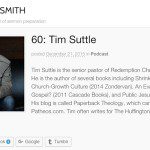 I’ve been reading some Wendell Berry this week in preparation for what I’m talking about on Sunday. I love his straight forward and often hilarious take on life–for instance: hell, or limits, or farming.
I’ve been reading some Wendell Berry this week in preparation for what I’m talking about on Sunday. I love his straight forward and often hilarious take on life–for instance: hell, or limits, or farming.
I ran across this note int he introduction to his book, Sex, Economy, Freedom, and Community, which is a collection of eight essays. This is from the preface entitled “The Joy of Sales Resistance,” which is written as a letter to “Dear Reader.” Wendell Berry is so… well, just read this.
“An essayist must be aware of the danger of becoming just one more in this mob of drummers. He (as a matter of syntactical convenience, I am speaking only of men essayists) had better understand with some care what it is that he has to sell, what he has to give away, and certainly also what he may have that nobody else will want.
I do have an interest in this book, which is for sale. (If you have bought it, dear reader, I thank you. If you have borrowed it, I honor your frugality. If you have stolen it, may it add to your confusion.) Most of the sale price pays the publisher for paper, ink, and other materials, for editorial advice, copyediting, design, advertising (I hope), and marketing. I get between 10 and 15 percent (depending on sales) for arranging the words on the pages. As I understand it, I am being paid only for my work in arranging the words; my property is that arrangement. The thoughts in this book, on the contrary, are not mine. They came freely to me, and I give them freely away. I have no “intellectual property,” and I think that all claimants to such property are thieves.
I am, I acknowledge, a white Protestant heterosexual man, and can only offer myself as such. I take no particular pride in my membership in this unfashionable group, nor do I consider myself in any way its spokesman. I do, however, ask you to note, dear reader, that this membership confers on me a certain usefulness in that it leaves me with no excuses and nobody to blame for my faults except myself. In fact, I am only grateful to my parents, my family, and my friends, who have done their best to make me better than I am. On my more charitable days, I am grateful even to my enemies, who have sharpened my mind and who have done me the service of being, as a rule, wronger than I am.
I am well aware that you cannot give your thoughts to someone who will not take them, and I am prepared for that. I would like to be agreed with, of course, but the rules of publication require me to be willing also to be disagreed with, to be ignored, and even to be disliked. Those who are moved by this book to disagreement or dislike will take discomfort, I hope, from hearing that some of my readers treat me kindly.
Kindness from readers is something that no essayist (and no writer of any other kind) has a right to expect. The kindness I have received from readers I count as the only profit from my work that is entirely net. I am always grateful for it and often am deeply moved by it.
But kindness is not—is never—the same as complete agreement. An essayist not only has no right to expect complete agreement but has a certain responsibility to ward it off. If you tell me, dear reader, that you agree with me completely, then I must suspect one or both of us of dishonesty. I must reserve the right, after all, to disagree with myself.
But however much I may change my mind, I will never agree with those saleswomen and salesmen who suggest that if I will only do as they say, all will be fine. All, dear reader, is not going to be fine. Even if we all agreed with all the saints and prophets, all would not be fine. For we would still be mortal, partial, suffering poor creatures, not very intelligent and never the authors of our best hope.”










